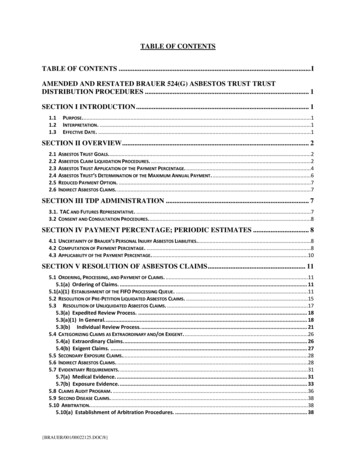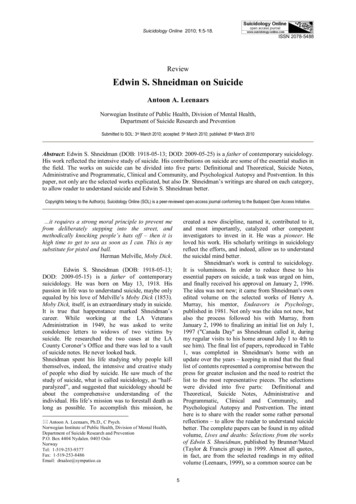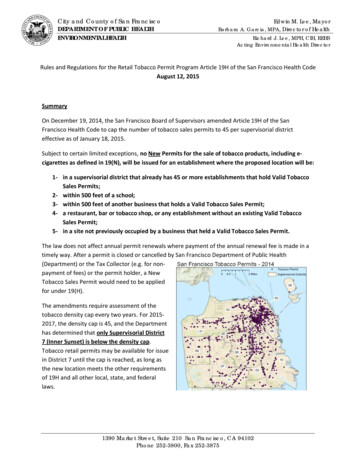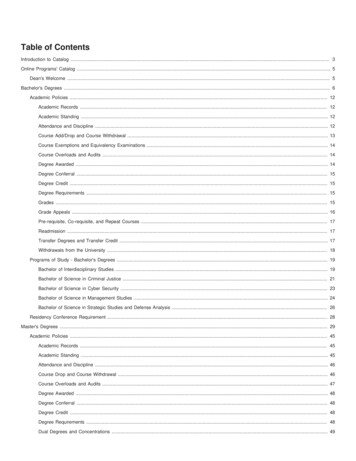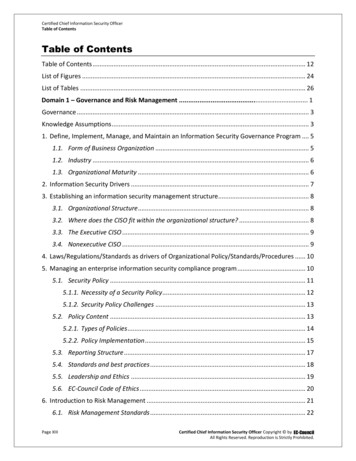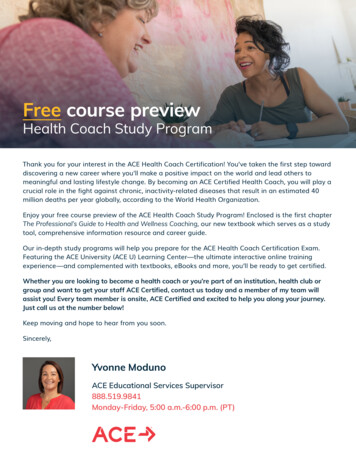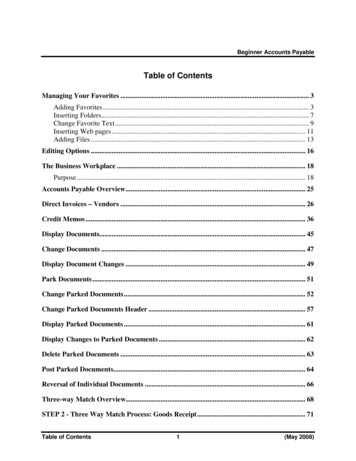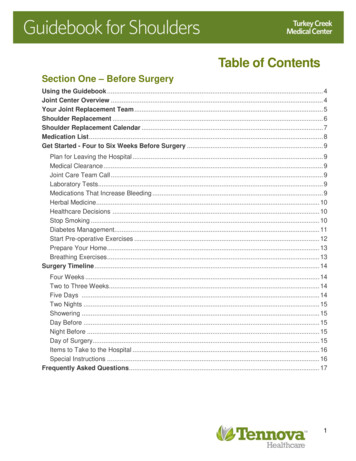
Transcription
Table of ContentsSection One – Before SurgeryUsing the Guidebook . 4Joint Center Overview . 4Your Joint Replacement Team . 5Shoulder Replacement . 6Shoulder Replacement Calendar . 7Medication List . 8Get Started - Four to Six Weeks Before Surgery . 9Plan for Leaving the Hospital . 9Medical Clearance . 9Joint Care Team Call . 9Laboratory Tests. 9Medications That Increase Bleeding . 9Herbal Medicine . 10Healthcare Decisions . 10Stop Smoking . 10Diabetes Management. 11Start Pre-operative Exercises . 12Prepare Your Home . 13Breathing Exercises . 13Surgery Timeline . 14Four Weeks . 14Two to Three Weeks. 14Five Days . 14Two Nights . 15Showering . 15Day Before . 15Night Before . 15Day of Surgery. 15Items to Take to the Hospital . 16Special Instructions . 16Frequently Asked Questions. 171
Table of ContentsSection Two – At the HospitalUnderstanding Anesthesia .19Anesthesiologists.19Types of Anesthesia .19Side Effects .19Understanding Pain .19Pain Scale .19Hospital Care – What to Expect .20Before Surgery .20During Surgery .20After Surgery .20Post-op Day 1 .21Physical Therapy After Surgery . 21-22Discharge Options .23Frequently Asked Questions.24Section Three – At Home After SurgeryCaring for Yourself at Home.25Be Comfortable .25Body Changes.25Blood Clots .25Compression Stockings.25Incision Care (Dermabond Prineo Skin Closure) . 26-27Recognizing Complications .28InfectionBlood ClotsPulmonary EmbolismPost-Hospital Goals .29Weeks One to Six .29Weeks Six to 12 .29Weeks 12 Plus .302
Table of ContentsSection Three – At Home After Surgery (Con’t.)Post-operative Exercises. 31-38Pendulum ExercisesExternal Rotation with StickSupine Active Assisted Forward Elevation (SAAFE)Shoulder PrecautionsActivities of Daily Living . 39-41StandingBed TransfersCar TransfersGetting DressedAround the House .42Dos and Don’ts.43What to DoExerciseRecommended Exercise Classes .44Lifetime Follow-up Visits .45Frequently Asked Questions.46Dr. Edwin Spencer Discharge Instructions . . 47-49Section Four – AppendixGlossary . 50Important Phone Numbers . . 513
Section One:Before SurgeryWelcomeWe are pleased you have chosen Turkey CreekMedical Center for your shoulder replacementsurgery.The goal of surgery is to: Relieve painRestore independence and functionReturn to an active lifestyleUsing the GuidebookThe Guidebook will assist you with: What to expectWhat you need to doHow to care for your new shoulderYour doctor, nurse, or therapist may add or change any of the recommendations. Always use theirrecommendations first and ask questions if you are unsure.Joint Center OverviewWe offer a unique program to encourage discharge from the hospital in one to two days aftersurgery. Program features include: Nurses and therapists trained to work with shoulder patientsCasual clothesPrivate roomsFamily and friends as “coaches”VIP menu optionsOrthopedic Coordinator who coordinates pre-operative care and discharge planningPatient Guidebook4
Your Joint Replacement TeamOrthopedic Surgeon - will perform the procedure to repair your damaged joint.Registered Nurse (RN) - will ensure orders by your doctor are completed.Physical Therapist (PT) - will guide you through functional daily activities and teach you exercisesto regain your strength/motion.Occupational Therapist (OT) - will guide you on performing tasks such as bathing/dressing anddemonstrate home equipment use.Orthopedic Coordinator will: Coordinate discharge plan. Act as your advocate throughout treatment. Answer questions and coordinate hospital care.Case Manager will: Review at-home needs after surgery. Coordinate discharge plan.5
Shoulder rResurfacingStemmedHemiarthroplastyTotal ShoulderReplacementReverse TotalShoulderReplacement6
Shoulder Replacement CalendarWrite in the date for your appointments for pre-op labs or tests; pre-op class; and any additionalappointments to see your primary care doctor or specialist.MondayTuesdayWednesdayThursdayFriday6 WeeksBeforeSurgery5 WeeksBeforeSurgery4 WeeksBeforeSurgery3 WeeksBeforeSurgery2 WeeksBeforeSurgery1 WeekBeforeSurgery7
Medication ListPlease fill out the Medication List with the requested information.Name:MedicationName/DosageWhat is the name ofyour medication?What is the dosage?Family Doctor:InstructionsWhen and how do youtake this medication?Reason for TherapyDurationHow long have youWhy are you taking thisbeen taking thismedication?medication?8
Get Started - Four to Six Weeks Before SurgeryPlan for Leaving the HospitalThe Orthopedic Coordinator and Case Manager will develop a discharge plan that meets yourneeds. Patients should expect to go directly home to recover in the privacy and comfort of their ownsurroundings.Medical ClearanceIf medical clearance is required, your surgeon’s office will communicate this with you and assist withscheduling an appointment to have this completed.If you need to see your medical doctor, it will be for pre-operative medical clearance. This is inaddition to seeing your surgeon before surgery. You may require additional medical testing in orderto be medically cleared for surgery and anesthesia.Joint Care Team CallAfter surgery has been scheduled, you will be contacted by a member of the Joint Care Team to: Verify you have scheduled your pre-admissions testing appointment at the hospital. Act as a liaison for coordination of your pre-operative care. Verify you have made an appointment with your primary doctor and have obtained preoperative tests your surgeon ordered. Answer questions and direct you to hospital resources.Laboratory TestsYou should also receive a laboratory-testing letter from your surgeon. Follow the instructions in thisletter.Medications That Increase BleedingYour doctor should tell you when to stop any medications before surgery. For example, discontinueall anti-inflammatory medications such as aspirin, Ibuprofen, Advil, Motrin , Naproxen, Vitamin E,etc. These medications may increase bleeding. If you are taking a blood thinner, you will needinstructions for stopping the medication. The pre-admission testing nurse will instruct you about yourother medications.9
Herbal MedicineHerbal medicines and supplements can interfere with othermedicines. Check with your doctor to see if you need to stoptaking your herbal medicines before surgery.Examples of herbal medicines: fish oil, Echinacea, ginkgo,ginseng, ginger, licorice, garlic, valerian, St. John’s wort,ephedra, goldenseal, feverfew, saw palmetto, and kava-kava.Healthcare DecisionsAdvance Medical Directives are printed instructions that communicate the patient's wishes regardinghealthcare. There are different directives. Consult your attorney concerning the legal implications ofeach. A Living Will explains your wishes if you have a terminal condition, irreversible coma, andare unable to communicate. Appointment of a Healthcare Agent (sometimes called a Medical Power of Attorney) letsyou name a person (your agent) to make medical decisions if you become unable to do so. Healthcare Instructions are your choices regarding use of life-sustaining equipment,hydration, nutrition, and pain medications.If you have an Advance Medical Directive, bring a copy of the document with you to the hospital.Stop Smoking¹Smoking: Delays your healing process. Reduces the size of blood vessels anddecreasesthe amount of oxygen circulated in your blood. Can increase clotting which can cause heartproblems. Increases blood pressure and heart rate.Smoking can impair oxygencirculation to your healingshoulder. Oxygen circulation isvital to the healing process.If you quit smoking before surgery, you will increase your ability to heal.10
When you are ready: Decide to quit. Choose the date. Limit the area where you smoke; don’t smoke at home. Throw away all cigarettes and ashtrays. Don’t put yourself in situations where others smoke. Reward yourself for each day without cigarettes. Remind yourself that this can be done – be positive! Take it one day at a time – if you slip, get back to your decision to quit. Check with your doctor if you need products like chewing gum, patches, or prescription aids.¹Smoking Threatens Orthopedic Outcomes. Negative effects should prompt orthopedists to address the issue with patients. S. Terry Canale, MD; Frank B.Kelly, MD; and Kaye Daugherty otrin is a registered trademark of McNeil-PPC, Inc. All rights reservedby trademark owner.Diabetes ManagementIf your blood glucose is not kept within a normal target range via diet, exercise, and medication, youare at risk for developing infection at the surgical site, your healing will be delayed, you are at risk fordeveloping a pulmonary embolism, and increased risk for deep venous thrombosis (DVT) or bloodclots.The best way to determine if your diabetes is under control is to perform a blood test callHemoglobin A1C. This test tells us what your average blood glucose levels have been over the last3 months. The target range is 7%, which correlates with an estimated average blood glucose level of170 mg/dl. If the result of your A1C is above 7%, for your safety, your surgery may be delayed untilyour diabetes is under control.For more information about diabetes, nutrition counseling, and healthy lifestyles, please consult adiabetes educator and or dietician.11
Start Pre-operative ExercisesBeginning an exercise program before surgery can help make recoveryfaster and easier. After surgery, you will temporarily be able to use onlyyour non-surgical arm to help you with everyday tasks. We suggest youpractice getting out of a chair with one hand, getting into and out of theshower, and using the non-surgical arm to complete activities such asgrooming, eating, and going to the bathroom.It is important to beas flexible and strongas possible beforehaving surgery.Exercising Before SurgeryConsult your doctor before starting pre-operative exercises.It is also important to strengthen your entire body, not just your arms before surgery. You shouldperform light endurance activities for your heart and lungs, for example walking for 10 to 15 minuteseach day. When you walk, remember to swing your arms naturally. This is helpful and valuable toprepare your shoulder for surgery.12
Prepare Your Home Put things you use often on a surface that is easy to reach. Check railings to make sure they are not loose. Complete house cleaning, do laundry, and put it away. Put clean linens on the bed. Prepare meals and freeze them. Cut the grass, tend the garden, and other yard work. Pick up throw rugs and tack down loose carpeting. Remove electrical cords and other obstructions from walkways. Install night lights in bathrooms, bedrooms, and hallways. Install grab bars in the shower/bathtub and put adhesive slip strips in the tub. Arrange to have someone collect your mail and take care of pets. Arrange for someone to drive for you after surgery until you are released to drive by yoursurgeon.Breathing ExercisesTo prevent problems such as pneumonia, practice breathing exercises using the muscles of yourabdomen and chest.Deep Breathing Breathe in through your nose as deep as you can. Hold your breath for 5 to 10 seconds. Breathe out as if you were blowing on hot soup.Notice your stomach going in. Breathe out for10 to 20 seconds.Techniques such as deepbreathing, coughing, andusing an Incentive Spirometermay help prevent respiratorycomplications after surgery. Take a break and then repeat the exercise 10 times.Coughing Take a slow deep breath. Breathe in through your nose and fill your lungs completely. Breathe out through your mouth and concentrate on your chest emptying. Repeat. Take another breath, but hold your breath and then cough hard. When you cough, focus onemptying your lungs. Repeat all steps twice.13
Surgery TimelineFour Weeks Before SurgeryStart Vitamins, IronYou may be instructed to take multivitamins, as well as iron. Iron helps build your blood count,which may help prevent the need for a blood transfusion.Two to Three Weeks Before SurgeryReview your Shoulder Guidebook- If you have any questions, please call the OrthopedicCoordinator at (865) 218-7436.Five Days Before SurgeryBegin Mupirocin (Bactroban) Treatment if OrderedIf your nasal swab tested positive for MRSA (Methicillin Resistant Staphylococcus Aureus) or MSSA(Methicillin Sensitive Staphylococcus Aureus), you will be prescribed a course of Mupirocin by yoursurgeon. This medication is to be use twice daily starting five days prior to your surgery.Mupirocin (Bactroban) Nasal Ointment Use*:Some
Joint Center Overview . Dr. Edwin Spencer Discharge Instructions . Beginning an exercise program before surgery can help make recovery faster and easier. After surgery, you will temporarily be able to use only your non-sur
